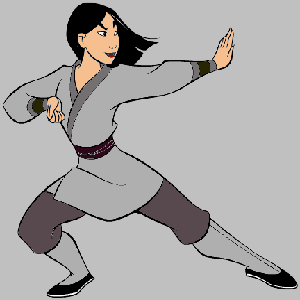
Mulan
CBUB Wins: 7
CBUB Losses: 6
CBUB Ties: 2
Win Percentage: 53.85%
Added by: Cylon Commander
Hua Mulan (花木蘭) is a heroine who joined an all-male army, described in a Chinese poem known as the Ballad of Mulan (木蘭辭). The poem was first written in the Musical Records of Old and New (古今樂錄) from the 6th century, the century before the founding of the Tang Dynasty; the original work no longer exists, and the original text of this poem comes from another work known as the Music Bureau Collection (樂府詩), an anthology of lyrics, songs, and poems, compiled by Guo Maoqian (郭茂倩) during the 11th or 12th century. The author explicitly mentions the Musical Records of Old and New as his source for the poem. Whether she was a historical person or whether the poem was an allegory has been debated for centuries — it is unknown whether the story has any factual basis.
The time setting of the story is uncertain. The earliest accounts of the legend state that she lived during the Northern Wei dynasty (386–534).
The poem is a ballad, meaning that the lines do not necessarily have equal numbers of syllables. The poem is mostly composed of five-character phrases, with just a few extending to seven or nine.
The story was expanded into a novel during the late Ming Dynasty (1368–1644). Over time, the story of Hua Mulan rose in popularity as a folk tale among the Chinese people on the same level as the Butterfly Lovers. It is one of the first poems in Chinese history to support the notion of gender equality. In 1998, Disney released an animated movie entitled Mulan based on the story.
Images with a green border may be set as the character's main profile image (For images 200x200 or 300x300 pixels square).
CBUB Match Record:
| Result | Opponent | My Score | Their Score | |
|---|---|---|---|---|
| Win | Totally Spies | 55 | to | 30 |
| Loss | Tifa Lockhart | 34 | to | 81 |
| Loss | Lady Jaye | 35 | to | 61 |
| Win | Princess Aurora | 54 | to | 21 |
| Loss | Batman | 2 | to | 21 |
| Loss | Renee Montoya | 8 | to | 23 |
| Loss | Kilowog | 10 | to | 12 |
Fantasy Teams Season 11 Record:
View the historical team line-up
| Result | Opponent | My Score | Their Score | |
|---|---|---|---|---|
| Win | Anna of Arendelle | 14 | to | 4 |
| Tie | Princess Merida | 5 | to | 5 |
| Win | Princess Merida | 9 | to | 1 |
| Win | Raya | 13 | to | 1 |
| Loss | Tiana (Disney) | 5 | to | 6 |
| Win | Belle (Disney) | 6 | to | 4 |







